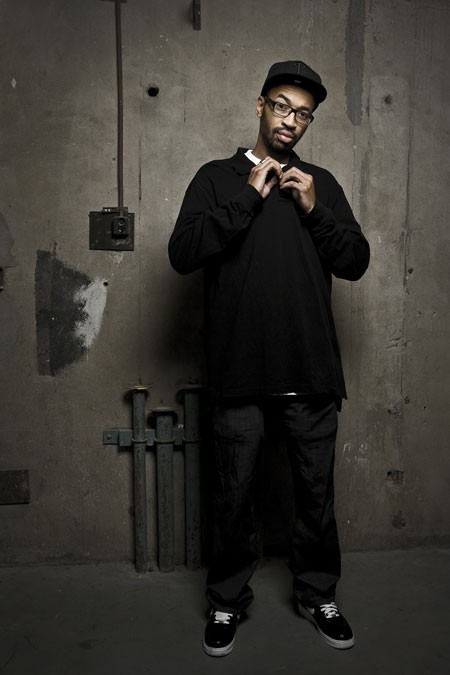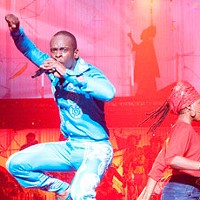Fifteen years after his death, the world is just beginning to unpack the complex musical and social reverberations touched off by Nigerian master Fela Kuti, father of Afrobeat and troubled champion of civil justice. Once called a cross between James Brown and Che Guevara, Fela made music that's just as provocative, dangerous, addictive and joyous today as when it was first recorded.
"It opened me up to a chasm of the black diaspora that was completely foreign to me. It was personal to me," DJ Rich Medina says, describing an awakening triggered by exposure to Fela's music, philosophy and life force.

-
CELEBRATION TIME: Rich Medina
Charlotte, too, will witness the transformative power of the legendary Nigerian producer/musician/radical/outlaw, when Radio Rehab presents Jump 'n' Funk, Medina's traveling dance party devoted to Fela's music and message, Oct. 18 at the Neighborhood Theatre.
For those in the know, Radio Rehab's monthly celebration of life and music is devoted to expanding horizons. Fela Kuti fits that goal to a T, and "we're super excited about this event coming to Charlotte," says Radio Rehab's Jalonda Blakeney.
Befitting his Cornell University education, former New Jersey b-boy Rich Medina speaks like a learned sociologist when the subject turns to the legacy of the African icon known as the "Black President."
Though Medina takes Fela's message of equality quite seriously, Jump 'n' Funk is far from a parched treatise on black studies. Taking its cue from Afrobeat, the musical genre invented by Fela, Medina's fabled four-hour-plus dance party is an epic, high-energy celebration of a world on the cusp of universal awakening. The long-running dance party is now set to celebrate its 11th anniversary, "dog years" in the world of club events, Medina admits.
Measured and thoughtful, Medina turns passionate when he recalls the musical discovery that launched Jump 'n' Funk. Coming across a "Best of" Fela LP, "I went home, put the record on and listened to it for a week straight," Medina recalls. "I don't think I listened to anything else."
Medina describes the music that transfixed him as "funk with a syncopated drum presentation." That's a good overview of Fela's Afrobeat, where the horn solo structure of jazz is cross-bred with polyrhythmic funk, salsa and juju. Long, loping compositions drop the listener into circular songs where recurring solos loop back against themselves. It's a mid-tempo whirlwind, a half-speed hurricane that spits out blaring horns and passionate-political-and-sarcastic James Brown-style vocals.
For those just coming to the party, Fela Anikulapo Kuti devised Afrobeat in the 1970s as a reaction to performers he felt had turned their backs on their African roots. Lyrically, he condemned Western society, its capitalist greed and its hypocritical straightjacket of Judeo-Christian morality. Fela could be stridently militant. Indeed, his chosen middle name of Anikulapo means "he who carries death in his pouch." For all his faults, including blatant sexism, Kuti's howling, jumping, oddly accentuated voice was the voice of the downtrodden. As transformative and uniting as Bob Marley, Fela was also as divisive and prickly as Sly Stone. The stamp of his innovative talent is felt on any groove-based music that came after him.
Fela paid a terrible price for his convictions. His personal life was a harrowing litany of police beatings, railroadings in kangaroo courts and brushes with death at the hands of the Nigerian military. When he was finally felled by AIDS in 1997, Fela's music wasn't widely known in the mainstream lexicon, but a resurgent interest in the Black President and his legacy has been growing steadily. Efforts like Jump 'n' Funk and the hit Broadway show Fela! have pumped up the Afrobeat pioneer's profile.
Indeed, Fela has gotten so big that Rich Medina has been able to expand Jump 'n' Funk to include other Afrobeat artists, including live collaborations with both of Fela's sons, Femi and Seun Kuti.
A typical broiling Jump 'n' Funk set mashes disparate musics over an ever-morphing Afrobeat bed that runs like the pulse of life through funk, soul standards and even the Beatles. For former basketball player Medina, the Beatles-Fela combo, dubbed Afro-Beatles, is a "lay-up," due to an obscure connection between the two artists. Many know that Beatle Paul McCartney's Band on the Run was recorded in Lagos, Nigeria. What is forgotten is that "Fela Kuti had Paul McCartney removed from Nigeria," says Medina. "He claimed [The Beatles] were thieves ... taking his music."
Now, courtesy of Medina, the contentious "consummate rock band and consummate protest musician" have buried the hatchet, joining in celebration on the dance floor. Perhaps Fela would understand, because his legacy was to fight for the dignity of life while remembering its joyousness.
